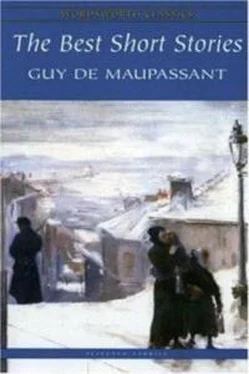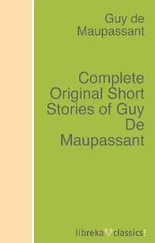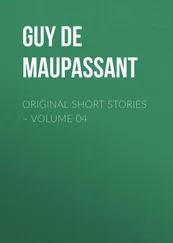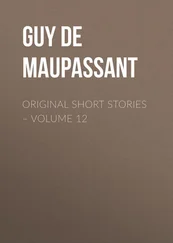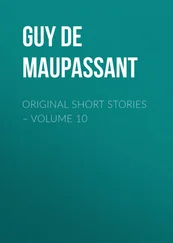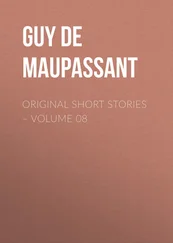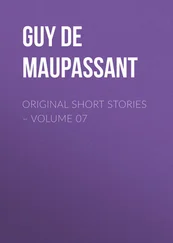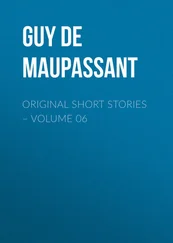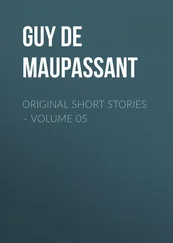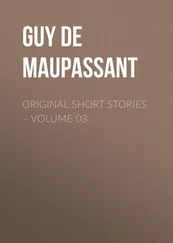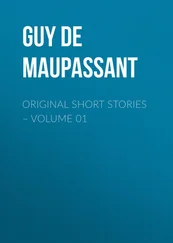Suddenly she remembered the loft, in order to reach which one had to take a ladder. Surely he must have hidden there in order to surprise her. He must have been held by savages on some distant shore, unable to escape until now, and he had returned, worse that ever. There was no doubting the quality of that voice. She raised her head and asked: "Are you up there, Patin?"
Patin did not answer. Then, with a terrible fear which made her heart tremble, she climbed the ladder, opened the skylight, looked, saw nothing, entered, looked about and found nothing. Sitting on some straw, she began to cry, but while she was weeping, overcome by a poignant and supernatural terror, she heard Patin talking in the room below.
He seemed less angry and he was saying: "Nasty weather! Fierce wind! Nasty weather! I haven't eaten, damn it!"
She cried through the ceiling: "Here I am, Patin; I am getting your meal ready. Don't get angry."
She ran down again. There was no one in the room. She felt herself growing weak, as if death were touching her, and she tried to run and get help from the neighbors, when a voice near her cried out: "I haven't had my breakfast, by G—!"
And the parrot in his cage watched her with his round, knowing, wicked eye. She, too, looked at him wildly, murmuring: "Ah! so it's you!"
He shook his head and continued: "Just you wait! I'll teach you how to loaf."
What happened within her? She felt, she understood that it was he, the dead man, who had come back, who had disguised himself in the feathers of this bird in order to continue to torment her; that he would curse, as formerly, all day long, and bite her, and swear at her, in order to attract the neighbors and make them laugh. Then she rushed for the cage and seized the bird, which scratched and tore her flesh with its claws and beak. But she held it with all her strength between her hands. She threw it on the ground and rolled over it with the frenzy of one possessed. She crushed it and finally made of it nothing but a little green, flabby lump which no longer moved or spoke. Then she wrapped it in a cloth, as in a shroud, and she went out in her nightgown, barefoot; she crossed the dock, against which the choppy waves of the sea were beating, and she shook the cloth and let drop this little, dead thing, which looked like so much grass. Then she returned, threw herself on her knees before the empty cage, and, overcome by what she had done, kneeled and prayed for forgiveness, as if she had committed some heinous crime.
The Piece of String
It was market–day, and from all the country round Goderville the peasants and their wives were coming toward the town. The men walked slowly, throwing the whole body forward at every step of their long, crooked legs. They were deformed from pushing the plough which makes the left–shoulder higher, and bends their figures side–ways; from reaping the grain, when they have to spread their legs so as to keep on their feet. Their starched blue blouses, glossy as though varnished, ornamented at collar and cuffs with a little embroidered design and blown out around their bony bodies, looked very much like balloons about to soar, whence issued two arms and two feet.
Some of these fellows dragged a cow or a calf at the end of a rope. And just behind the animal followed their wives beating it over the back with a leaf–covered branch to hasten its pace, and carrying large baskets out of which protruded the heads of chickens or ducks. These women walked more quickly and energetically than the men, with their erect, dried–up figures, adorned with scanty little shawls pinned over their flat bosoms, and their heads wrapped round with a white cloth, enclosing the hair and surmounted by a cap.
Now a char–a–banc passed by, jogging along behind a nag and shaking up strangely the two men on the seat, and the woman at the bottom of the cart who held fast to its sides to lessen the hard jolting.
In the market–place at Goderville was a great crowd, a mingled multitude of men and beasts. The horns of cattle, the high, long–napped hats of wealthy peasants, the head–dresses of the women came to the surface of that sea. And the sharp, shrill, barking voices made a continuous, wild din, while above it occasionally rose a huge burst of laughter from the sturdy lungs of a merry peasant or a prolonged bellow from a cow tied fast to the wall of a house.
It all smelled of the stable, of milk, of hay and of perspiration, giving off that half–human, half–animal odor which is peculiar to country folks.
Maitre Hauchecorne, of Breaute, had just arrived at Goderville and was making his way toward the square when he perceived on the ground a little piece of string. Maitre Hauchecorne, economical as are all true Normans, reflected that everything was worth picking up which could be of any use, and he stooped down, but painfully, because he suffered from rheumatism. He took the bit of thin string from the ground and was carefully preparing to roll it up when he saw Maitre Malandain, the harness maker, on his doorstep staring at him. They had once had a quarrel about a halter, and they had borne each other malice ever since. Maitre Hauchecorne was overcome with a sort of shame at being seen by his enemy picking up a bit of string in the road. He quickly hid it beneath his blouse and then slipped it into his breeches, pocket, then pretended to be still looking for something on the ground which he did not discover and finally went off toward the market–place, his head bent forward and his body almost doubled in two by rheumatic pains.
He was at once lost in the crowd, which kept moving about slowly and noisily as it chaffered and bargained. The peasants examined the cows, went off, came back, always in doubt for fear of being cheated, never quite daring to decide, looking the seller square in the eye in the effort to discover the tricks of the man and the defect in the beast.
The women, having placed their great baskets at their feet, had taken out the poultry, which lay upon the ground, their legs tied together, with terrified eyes and scarlet combs.
They listened to propositions, maintaining their prices in a decided manner with an impassive face or perhaps deciding to accept the smaller price offered, suddenly calling out to the customer who was starting to go away:
"All right, I'll let you have them, Mait' Anthime."
Then, little by little, the square became empty, and when the Angelus struck midday those who lived at a distance poured into the inns.
At Jourdain's the great room was filled with eaters, just as the vast court was filled with vehicles of every sort—wagons, gigs, chars–a–bancs, tilburies, innumerable vehicles which have no name, yellow with mud, misshapen, pieced together, raising their shafts to heaven like two arms, or it may be with their nose on the ground and their rear in the air.
Just opposite to where the diners were at table the huge fireplace, with its bright flame, gave out a burning heat on the backs of those who sat at the right. Three spits were turning, loaded with chickens, with pigeons and with joints of mutton, and a delectable odor of roast meat and of gravy flowing over crisp brown skin arose from the hearth, kindled merriment, caused mouths to water.
All the aristocracy of the plough were eating there at Mait' Jourdain's, the innkeeper's, a dealer in horses also and a sharp fellow who had made a great deal of money in his day.
The dishes were passed round, were emptied, as were the jugs of yellow cider. Every one told of his affairs, of his purchases and his sales. They exchanged news about the crops. The weather was good for greens, but too wet for grain.
Suddenly the drum began to beat in the courtyard before the house. Every one, except some of the most indifferent, was on their feet at once and ran to the door, to the windows, their mouths full and napkins in their hand.
Читать дальше
